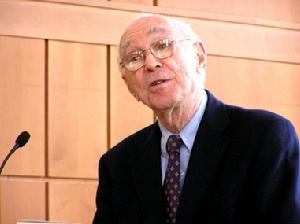 杰罗姆·布鲁纳(Jerome Seymour Bruner,1915一)于1915年10月1日出生在美国纽约。1937年在杜克大学获文学学土学位,随即在杜克大学注册成为心理学研究生,第二年转学到哈佛大学心理学系,在著名实验心理学家拉什利(K.S.Lashleg)指导下,于1941年获博士学位。这时他的主要兴趣是动物和人类的知觉过程心理学。第二次世界大战期间应召服兵役,先后在美国战争情报署和同盟远征军最高统帅部心理战部门工作,主要是研究公众的态度和纳粹德国的宣传技术。1945年返回哈佛大学任心理学讲师,1948年任副教授,1952年任教授。1960年,他与米勒(G.Miller)一起创办了"哈佛认知研究中心",1961年起任该中心主任直至1972年。1972年至1980年在英国牛津大学任实验心理学瓦茨(Walts)教席。1980年返回美国任纽约大学的人文学科新学院院长之职。
杰罗姆·布鲁纳(Jerome Seymour Bruner,1915一)于1915年10月1日出生在美国纽约。1937年在杜克大学获文学学土学位,随即在杜克大学注册成为心理学研究生,第二年转学到哈佛大学心理学系,在著名实验心理学家拉什利(K.S.Lashleg)指导下,于1941年获博士学位。这时他的主要兴趣是动物和人类的知觉过程心理学。第二次世界大战期间应召服兵役,先后在美国战争情报署和同盟远征军最高统帅部心理战部门工作,主要是研究公众的态度和纳粹德国的宣传技术。1945年返回哈佛大学任心理学讲师,1948年任副教授,1952年任教授。1960年,他与米勒(G.Miller)一起创办了"哈佛认知研究中心",1961年起任该中心主任直至1972年。1972年至1980年在英国牛津大学任实验心理学瓦茨(Walts)教席。1980年返回美国任纽约大学的人文学科新学院院长之职。布鲁纳在众多领域进行了富有成效的研究,是一位在西方心理学界和教育界都享有声誉的学者,他在1959年任美国科学院科学教育委员会主席,主持了著名的伍兹霍尔中小学课程改革会议;1960年任总统教育顾问;1952年当选为社会心理学研究会理事长;1965年当选为美国心理学会主席。1962年获美国心理学会颁发的杰出科学贡献奖。布鲁纳论著甚丰,主要代表著作有:
《思维之研究(A Study of Think )》(1956,与人合作)、
《教育过程(The Process of Education)》(1960)、
《论认识(on Knowing)》(1964)、
《教学理论探讨(Toward a Theory of Instruction)》(1966)
《认知生长之研究(Studies in Cognitive Growth)》(1966,与人合作)、
《教育的适合性(The Relevance of Education)》(1971)、
《超越所给的信息(Beyond the Information Given)》(1973)
《儿童的谈话:学会使用语言(Child's Talk :Learning to Use Language)》(1983)
《心的探索(In Search of Mind)》(1984)
Brunerwas born in New York City on October 1, 1915. He completed his undergraduate education at Duke University where he received his A.B. in 1937. Bruner studied psychology at Harvard University immediately thereafter and was awarded his A.M. in 1939 and Ph.D. in 1941 (his doctoral thesis was entitled "A Psychological Analysis of International Radio Broadcasts of Belligerent Nations"). He worked with Gordon Allport in those years as a research assistant and a member of Allport graduate seminar. Upon finishing his doctorate, Bruner entered the United States Army's Intelligence Corps where his work focused upon propoganda (the subject of his doctoral thesis) as well as public opinion in the United States. He was the editor ofPublic Opinion Quarterly(1943-44).
1945-1972 Harvard University.Bruner returned to teach at Harvard in 1945 and quickly rose through the ranks from lecturer to full professor (1952). He was instrumental in establishing the pathbreaking Center for Cognitive Studies in 1960 and served as its director through 1972. Bruner was elected and served as president of the American Psychological Association during 1964-1965.
1972-1980 Oxford University. In 1972, Bruner sailed across the Atlantic (his great avocation is sailing) to take up a position as Watts Professor of Experimental Psychology at Oxford University.
1991-present. New York University Law School. Bruner came to NYU as the Meyer Visiting Professor in 1991 and continues (since 1998) as University Professor as well as Research Professor of Psychology. His first work at NYU Law School involved " founding and teaching the Colloquium on the Theory of Legal Practice - an effort to study how law is practiced and how its practice can be understood by using tools developed in anthropology, psychology, linguistics, and literary theory" (Bruner biography, 2000). He has become particularly interested in the application of narrative principles to an understanding of legal processes.
Thematic Chronology. Extending the structure suggested in the helpful review of Ornaghi & Groppo (1998), Bruner's lengthy & fruitful career might be analyzed across eight general periods and themes:
Graduate School & the Second World War
(1) 1939-1945 Initial professional formation; psychology of public opinion and propaganda.
Harvard University & the Center for Cognitive Study
(2) 1946-1950 Exposure to European Gestalt psychology and development of the "New Look" in psychology (perceptual processes as subject to external influences; "a constructivist view of perception" [Bruner, 1992]).
(3) 1950-1966 Development of cognitive & constructivist psychological approaches in the wake of exposure to the work of Vygotsky, Luria, & Piaget; championing the "Cognitive Revolution"
(4) 1967-1971 Infancy & early language studies
Oxford University
(5) 1970s Studies on the development of language and communication abilities beyond infancy
First "Retirement"
(6) Early 1980s Focus upon cultural roles and interactionism
(7) Late 1980s-early 1990s Narrative, autobiography, and construction of the self
New York University
(8) Late 1990s to the present. Law & narrative.
General Themes & Concepts in Bruner's Work.When asked by Bradd Shore (1997) if there were "something characteristic of all the things that interest you--a kind of [Wittgensteinian] family resemblance?" Bruner said there was: "I see it as a kind of pragmatics of knowledge acquisition...That is you organize and construct knowledge on the basis of encounters with the world, for some use. When I say pragmatic, I really mean pragmatic in the deeply American tradition. Perhaps, more in the Peircean sense of pragmatic...Peirce's 'pragmaticism'." (Shore, 1997, p. 20).
Bruner and his colleagues at Harvard and Oxford describe three systems by which a developing child acquires knowledge. While some call these stages, Bruner explicitly rejects stage language and refers to them as systems or ways of organizing knowledge. He argues that, while there may be a greater proponderance of one or another system used at some point in development, the child will use all three systems as well.
- Enactive. A child uses action to manipulate objects
- Iconic. A child employs mental images which are primarily visual or otherwise sensorily-based
- Symbolic. By means of language, reasoning, and other systems of meaning.
www.psychspace.com心理学空间网Sources
- Bruner, J. S. (1983).In search of mind: Essays in autobiography. New York: Harper & Row. [Bruner's autobiography.]
- Evory, A. (Ed.).Contemporary authors(New revision series). Vol. 1 (pp. 76-77) Detroit, MI: Gale Research Company.
- Faculty biography: Jerome Bruner. (n.d.). New York University: School of Law. Downloaded 3/15/03 from <http://www.law.nyu.edu/faculty/profiles/bios/brunerj_bio.html>
- Shore, B. (1997). Keeping the conversation going: An interview with Jerome Bruner.Ethos, 25(1), 7-62.

